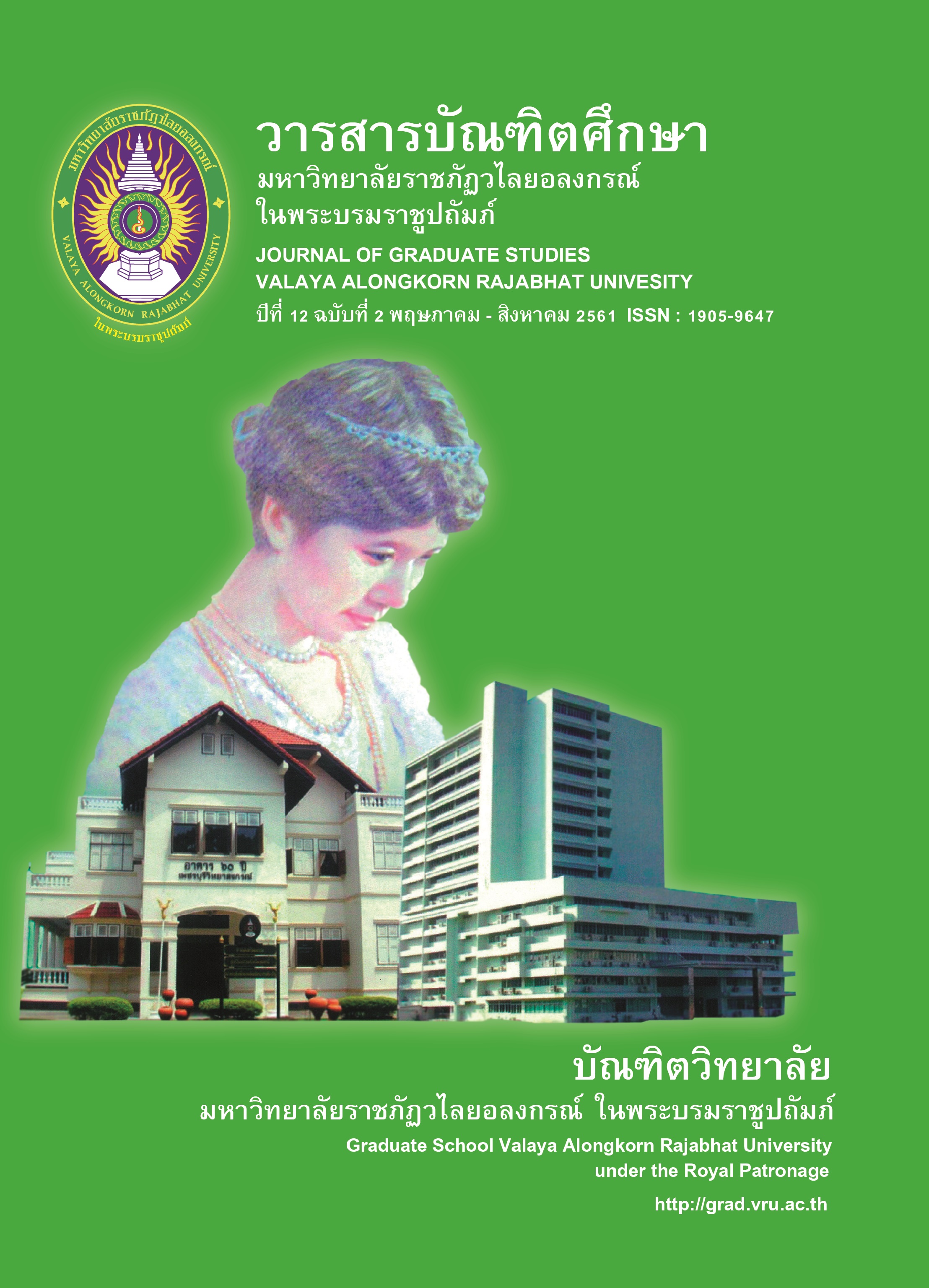A STUDY OF PRODUCTIVITY-BASED LEARNING ACTIVITIES OF THE COURSE PRINCIPLES OF LEARNING MANAGEMENT TOWARD ABILITY TO LEARN OF UNDER GREADUATE STUDENTS IN FACULTY OF EDUCATION, VALAYA ALONGKORN RAJABHAT UNIVERSITY UNDER THE ROYAL PATRONAGE
Main Article Content
Abstract
The objectives of this research were to study the production learning activities and to compare the ability to learning of under graduate students. The production activities were organized in the course of learning principle management with 80%. The sampling is 2nd year of undergraduate students, Faculty of Education, Valaya Alongkorn Rajabhat University under the Royal Patronage, Prathumthani Province in the first semester of academic year 2559. They studied the principles of learning management, code number 1022002, a classroom with 29 students who were acquired by cluster random sampling. The tool used in this study is the learning measurement 50 items with reliability 0.87. The Average Standard Deviation and t-test one sample.
The research found that:
- The Production Learning Activities are research-Based Learning with Collaborative Learning. There were 4 activities; activity 1: the teachers used research results to teach. They discussed and summed up the knowledge, activity 2: the students studied the research on learning subject. They discussed and summed up the knowledge, activity 3: the teachers used research process in teaching by designing learning management with the research process and the collaborative learning and activity 4: the students conduct research by teaching as a team with 2-3 students in the school. The students have to collect the data from the real conditions. The students have to take the information from the teaching to analyze and sum up the report / presentation in class for exchanging.
- The students of under graduate who were organized by production activities in the course of Principles of Learning Management had mean scores on learning ability higher than the 80 percent of the established criteria at the statistical significance at the 0.05 level.
Article Details

This work is licensed under a Creative Commons Attribution-NonCommercial-NoDerivatives 4.0 International License.
บทความทุกเรื่องได้รับการตรวจความถูกต้องทางวิชาการโดยผู้ทรงคุณวุฒิ ทรรศนะและข้อคิดเห็นในบทความ Journal of Global of Perspectives in Humanities and Social Sciences (J-GPHSS) มิใช่เป็นทรรศนะและความคิดของผู้จัดทำจึงมิใช่ความรับผิดชอบของบัณฑิตวิทยาลัย มหาวิทยาลัยราชภัฏวไลยอลงกรณ์ ในพระบรมราชูปถัมภ์ กองบรรณาธิการไม่สงวนสิทธิ์การคัดลอก แต่ให้อ้างอิงแหล่งที่มา
References
บุญเสริม วีสกุล. (2555). วิกฤตอุดมศึกษาไทย. กรุงเทพฯ : โรงพิมพ์แห่งจุฬาลงกรณ์มหาวิทยาลัย.
บรรดล สุขปิติ. (2556). การทดลองใช้นวัตกรรมตามสภาพจริงหน่วยวิจัยเครือข่ายการพัฒนาครู มหาวิทยาลัยราชภัฏนครปฐม. สืบค้นจากhttps://research.npru.ac th/development/.
ไพฑูรย์ สินลารัตน์. (2559). ปรัชญาการศึกษาเชิงสร้างสรรค์และผลิตภาพ. กรุงเทพฯ : โรงพิมพ์แห่งจุฬาลงกรณ์มหาวิทยาลัย.
ไพฑูรย์ สินลารัตน์. (2558). ปฏิรูปการเรียนรู้ ปฏิรูปการศึกษากลับทางจากล่างขึ้นบน. กรุงเทพฯ :บริษัท พี เอ.ลีฟวิ่ง จำกัด.
วรพจน์ วงศ์กิจรุ่งเรือง และอธิป จิตตฤกษ์. (2554). ทักษะแห่งอนาคตใหม่ การศึกษาเพื่อศตวรรษที่ 21. กรุงเทพฯ : Openworlds.
สมพร โกมารทัต. (2557). การเรียนรู้เชิงผลิตภาพ. วารสารศึกษาศาสตร์หาวิทยาลัยสงขลานครินทร์วิทยาเขตปัตตานี. 25(3) : 1-11.
สุวรรณา จุ้ยทอง. (2560). การออกแบบหน่วยการเรียนรู้อิงมาตรฐานเพื่อส่งเสริมการเรียนรู้เชิงผลิตภาพ. วารสารวไลยอลงกรณ์ปริทัศน์. 7(2) : 143-152.
อนงค์นาฎ บรรหาร. (2555). เรื่องการพัฒนาหน่วยการเรียนรู้บูรณาการประเพณีและวัฒนธรรมในอำเภอชนบทด้วยการจัดการเรียนรู้โดยใช้โครงงาน รายวิชา ส16101 สังคมศึกษาศาสนาและวัฒนธรรม สำหรับนักเรียนชั้นประถมศึกษาปีที่ 6. วิทยานิพนธ์ปริญญาศึกษาศาสตร มหาบัณฑิตสาขาวิชาหลักสูตรและการสอน บัณฑิตวิทยาลัยมหาวิทยาลัยขอนแก่น.
Bruning, R., Schraw, G.,Norby, M.,&Ronning, R. (2004).Cognitive psychology and instruction (4th ed.).Upper Saddle River, NJ: Merrill/Prentice Hall.
Furrer, C., Skinner, E. (2003). Sense of relatedness as a factor in children,s academic engagement and performance. Journal of Educational Psychology. Vol. 95. No. 1, pp. 148-162.
Nunnally, Jum. (1967). Psychometric theory. New York: McGraw-Hill.
Wiggins, Grant and McTighe, Jay. (2006). Understanding by design. Alexandria.VA: Association for Supervision and Curriculum Development.


